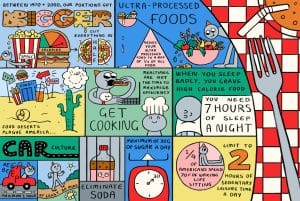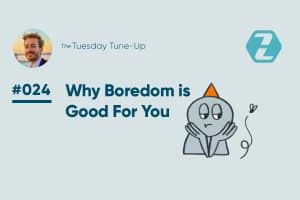Ok, I don’t finish 4 books a day – I READ from 4 different books each day. And this simple switch changed everything.
But, before this, my reading sucked and everything I saw on the internet said “you need to read more!” But, I never did. I remember being forced to read books in high school and since then always found reading as a chore. I was a 1 book a year kinda person until I discovered one strategy, one way of reading, that took me from a 1 book a year person, to a 30 book a year person. In this video I’m going to reveal my strategy that finally made me a reader that reads 4 books a day.
But why read? Who cares?
Well, I read about 100 scientific articles on reading and it seems that there are 3 main benefits to reading:
- 📚 You get better at learning and using the knowledge you already have. It’s weights for the brain. Reading strengthens brain connectivity and neuroplasticity. It boosts activity in language and sensory areas—effects that persist for days.
- 🧠 Reading keeps the brain young. Older adults who read regularly experience a 32% slower rate of mental decline.
- 💡 Reading anything, even fiction, improves your ability to communicate with other humans. It enhances your ability to understand others’ thoughts and feelings.
And all those things happen no matter what you read. I didn’t even mention the content!
Books are humanity’s greatest technology. You can download the best thoughts of the best minds, distilled over entire lifetimes, and absorb them in just a few hours. For the price of lunch! How lucky are we to have access to these things!
A Brief History of Time was written by a genius theoretical physicist over 6 years and uses Stephen Hawking’s lifetime of knowledge and research for us to read in a weekend and learn about time and how the universe came to be. Guns, Germs, and Steel is a masterclass on civilization, technology, and history that took 25 years of research to compose that we can read on a long weekend. Lord of the Rings took J.R.R. Tolkien 12 years to write and in it he created new languages, races, and histories that changed the face of fantasy and fiction forever.
But… You know those books. The hard ones. The fancy ones. The book you “must read in your lifetime or else you are dumb dead toad that should be eaten by a snake!”
I could never finish them. Which resulted in me stopping reading because I felt guilty about not finishing a book. Which kept me and my stellar 1 book a year count.
Until the four-book system. It was perfect. One summer, I simply read four books a day, and for 3 years since trying it, I’m hitting about 30 books total a year. Here’s how it works.
1. The Four-Book Arsenal
I read four books a day. For real, but I don’t finish 4 books a day. I have a rotation of 4 books a day that I vary based on my mental energy/motivation during the day.
For example my books are usually:
- Difficult non-fiction (Like the Wealth of Nations)
- Accessible non-fiction (Like Naked Economics)
- Classic literature (Like Iliad and Odyssey)
- Pure fun fiction (Like Harry Potter)
Early morning Book 1: Difficult non-fiction
Usually, first thing in the morning before my day starts, I’ll read just 30 minutes of one of these brain-changing difficult non-fiction books. I may only make it two or three pages in all that time (because I am looking up words, trying to think about what I just read, or simply rereading the same sentence 17 times), but I sit down and read it. Right now I’m reading the Wealth of Nations. I would put it down if I don’t like it, but it’s actually interesting. I’m learning about how economics and capitalism worked through some guy who lived in the 18th century, and I love it!
Early Morning Book 2: Accessible Non-Fiction
Right after the difficult non-fiction, I’ll move to something more accessible that’s written in modern english. Importantly, all of my books, including this one, is something I’m actually interested in. I like learning about philosophy so currently, I’m reading Sophie’s World, which is an easy intro into philosophy.
What I’ve found, is that a lot of these “game-changing” books, like The Wealth of Nations, or The Principia by Isaac Newton, or even The Iliad and the Odyssey, are much more compelling and fun to read when you have a basic understanding of the history around the time they were written and the theories or science the book depends upon. For example, I only was able to actually read and enjoy the Iliad and the Odyssey after I learned about the history of the past 3,000 years in A Little History of the World and how around the time the book was written major civilizations, like the Egyptian and Greeks, were suffering from collapse and wars and in a transitional state. When you know that you learn about why the tone of the book is so against war. Also after I learned about the major “religion” of the time which was based around the Greek Gods from Mythos by Stephen Fry (such a good book!), I understood the mythology and the references to the Greek Gods throughout.
Post Lunch: Classical Literature
After lunch, if I have time at the doctor’s office or commuting, I’ll dive into a piece of classical literature. These books obey Lindy’s Law and have been around, and consistently read, by society for a reason. Again, I only last about 30 minutes reading this. But some, like Catcher and The Rye, I become engrossed in and read in a day.
My Evening Escape: Pure Fiction
I’ve always loved sci-fi and fiction even before I built my reading muscle. At night time, before bed, I’ll always read about an hour of some amazing fantasty fiction world to not get me thinking too hard before bed. Plus, sometimes, I’ll dream I’m in these worlds which is pretty cool. I’m reading the Cradle Series right now, but some of my favorites are the Iron Prince series, Harry Potter, Red Rising, Mistborn Trilogy, Stormlight Archive, Ender’s Game, Dune, and The Name of The Wind.
Oh, if you want to see my favorite 97 books ever you can get the list at https://zhighley.com/reading/!
Here are some more guidelines for the 4 book strategy.
2. Drop Books Like They’re Hot
Here’s where the magic happens. Be ok with putting the bad books down. Instead, get to know yourself and what books you like. Sometimes I’ll drop all four books on one day and replace them with another four.
Read anything. Seriously. It doesn’t matter.
Pick up a book, open it, start reading.
Don’t like it? Put it down.
Open another book.
Start reading.
Feeling “meh” about a book and want to read it later?
Put it down.
Pick up another book.
Read that.
What genre?
Who cares?
What do you want to read? What do you want to read?
Read that.
The muscle will build, and you’ll keep reading and keep reading.
Carry a book with you everywhere.
In the grocery store, at doctor’s appointments, in the subway.
Instead of picking up your phone, pick up the book.
You’ll feel better, trust me.
Buy the physical book. Build a library. Reread your books.
Share your books. Talk about your books. Enjoy the books.
Still not sure what to read? Walk into a bookstore.
Yes a real bookstore.
Look around, what excites you? Pick that one up, feel it in your hands.
Open to a random page, do you like what you see?
If no, put it down. If yes, buy it.
Congratulations. You’ve just built one of the best habits ever.
3. Let the binges happen
Before you know it you’ll have your 4 book arsenal. Here’s the even more fun part. Let the binges happen. About 25% of the time, I’ll pick up a book and not be able to put it down. That’s happened with Atomic habits for me, the Harry Potter Series, Red Rising, Walden, Stoner, Dracula, and countless others.
So what if you don’t read those 4 books a day? So what if you spend 2 months just reading Harry potter? You are reading right? My guess is on these binges you read more than you ever did before. And that’s the magic. Right there. Reading more, figuring out what you like, and growing.
4. Notice the Benefits
Within months of starting my Four-Book Arsenal, I was racking up the numbers, but who cares about the numbers, what was the actual impact on me?
I Understood more stuff: There is something superficial and transitory about googling or AI’ing the answers to everything. For example, when someone asked “who is the greek god of war?” I would google it and figure out it was Ares. But, after reading Iliad and Mythos, I know he was one of the 12 olympians and son of Zeus, saved Hera and Artemis, and was made to look like a fool in the Trojan War. That knowledge sticks around as is fun to talk about and learn more about (to me).
My Stress Disappeared: I discovered that reading is 300% better at reducing stress than walking and 700% better than playing video games⁸. This was time away from social media and screens and usually in nature (because I like to read outside). My evening fiction sessions became my most effective stress relief. If I felt super stressed? I’d just read fiction all day or take a weekend day to read outside after a walk, good food, and good sleep (magic).
My Decision-Making Improved: Studies reveal that books can promote empathy, social perception, and emotional intelligence, which are cognitive processes that can lead to greater survival⁵. Instead of jumping to quick answers I would weigh decisions out in my mind more slowly. Like my life was a book instead of a ChatGPT response.
My Memory Sharpened: Finally, when I was really interested in a book, I would try and learn as much as I could about the topic and, without realizing it, was practicing spaced repetition, or interleaved learning, which is one of the best ways to learn anything (according to evidence).
Bottom Line
OK, so overall, how can you implement and gain from the 4-book strategy?
Step 1: Pick Four Books Around What Interests You
Start by choosing four books that genuinely excite you—not what you think you “should” read, but what you’re actually curious about. I picked a sci-fi novel about space exploration, a productivity book, Adam Smith’s economics text, and a philosophy primer. The key is variety: one challenging non-fiction, one accessible non-fiction, one classic literature, and one pure entertainment. Don’t worry about being “intellectual”—follow your curiosity.
Step 2: Figure Out When the Best Time for You to Read Is
Map your energy levels throughout the day and match them to your book difficulty. I discovered my brain was sharpest at 6 AM (perfect for dense economics and nonfiction), focused but tired in the afternoon (ideal for classical literature), and completely drained at night (perfect for escapist fiction). Experiment to find your optimal reading windows.
Step 3: Get Rid of and Add Books at Will
Give yourself complete permission to swap books in and out of your arsenal whenever you want. If a book isn’t clicking, replace it immediately. I’ve swapped out dozens of books over the months—some were too boring, others too difficult for the wrong time of day, and some just didn’t match my mood. The goal is to always have four books you’re excited to pick up and carry a book with you everywhere. This flexibility keeps reading fun and gets you addicted to reading.
Step 4: Don’t take it so seriously and let the binges happen
The magical moments come when you are so engrossed in a book, you lose yourself in it. Time disappears. Before you know it, you’ve been reading for 4 hours. Don’t stop yourself because you “have to” or “should” read this other book, let the binges happen! These are books not Netflix!
The transformation was gradual but undeniable. Within 1 year, I went from reading 1 book a year to 30+, and I actually remembered more of what I read. The compound effect was remarkable—each book provided context for the next, creating an ever-expanding web of knowledge.
As Charlie Munger would say, become a learning machine and your life will change—and it’s been one of the most valuable compounding advantages of my life. So yeah, I read 4 books a day now. Not finish – read. And if past-me who treated books like kryptonite can do this, what’s your excuse? Your 4-book arsenal is waiting. What are you picking up first?”
Thanks for reading!
Zach
Works Cited
- Berns, Gregory S., et al. “Short- and Long-Term Effects of a Novel on Connectivity in the Brain.” Brain Connectivity, vol. 3, no. 6, 2013, pp. 590-600, doi:10.1089/brain.2013.0166.
- “Sophie’s World – Wikipedia.” Wikipedia, 5 days ago, en.wikipedia.org/wiki/Sophie’s_World.
- Brancia, Ercole Francesco. “Neuroscience Of Reading: Is Reading Good For The Brain?” LinkedIn, 2 Apr. 2023, www.linkedin.com/pulse/neuroscience-reading-good-brain-ercole-francesco-brancia.
- Curtin, Melanie. “Want to Strengthen Your Brain? Neuroscience Says to Start Reading This Immediately.” Inc.com, 5 Jan. 2021, www.inc.com/melanie-curtin/want-to-improve-brain-functioning-neuroscience-says-to-start-reading-this-immedi.html.
- Jacobs, Jochanan M., et al. “A Chapter a Day – Association of Book Reading with Longevity.” PLOS ONE, 2016, pmc.ncbi.nlm.nih.gov/articles/PMC5105607/.
- Munger, Charles T. “Charlie Munger Quotes.” Goodreads, www.goodreads.com/author/quotes/236437.Charles_T_Munger.
- Saygin, Zeynep M., et al. “Connectivity precedes function in the development of the visual word form area.” Nature Neuroscience, vol. 19, 2016, pp. 1250-1255.
- “Statistics About Reading 2025.” Healthy Happy Impactful, 5 Dec. 2024, healthyhappyimpactful.com/statistics-reading/.
- “The Power of Reading: Charlie Munger’s Secret Investing Weapon.” Picture Perfect Portfolios, 19 Mar. 2025, pictureperfectportfolios.com/power-of-reading-charlie-mungers-secret-investing-weapon/.
- “The Psychology of Human Misjudgment by Charlie Munger.” Farnam Street, 14 Jan. 2025, fs.blog/charlie-munger-recommended-books/.


